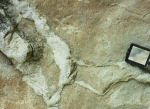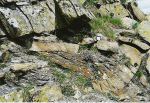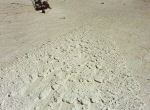Deep water sand systems commonly show evidence for post-depositional remobilisation. This can take the form of fluidisation, with dewatering structures and sand injections. Alternatively muddier units can become mobile and inject into adjacent beds. Then there are larger-scale slope failures such as slumps, slides and the transition into apparently less coherent debris flows. All of these processes can occur on many different scales, from individual beds of a few centimetres to 100s of metres of stratigraphy that collapse off down continental margins. They all represent deformations that are amenable to study using classic methods in structural geology. This research avenue explores the application of structural concepts, moving beyond simply using slump folds as kinematic indicators. It involves close collaboration and funding through the Turbidites Research Group. More information (including sponsor pages) is available on that website.
 Intrusive
pseudo-debrites (heavily disaggregated primary sediment) and contorted primary layering in a < 1m
slump sheet. Champsaur sandstones, French Alps.
Intrusive
pseudo-debrites (heavily disaggregated primary sediment) and contorted primary layering in a < 1m
slump sheet. Champsaur sandstones, French Alps.
 Strongly
asymmetric flame structures formed where substrate mud has injected into depositing sands at the palaeo-sea-bed.
Champsaur sandstones, French Alps.
Strongly
asymmetric flame structures formed where substrate mud has injected into depositing sands at the palaeo-sea-bed.
Champsaur sandstones, French Alps.
 Looking
down onto a bedding plane (top of a sandy turbidite) with irregular sand injections (sourced from underlying
units). Gorgoglione flysch, Lucanian Apennines.
Looking
down onto a bedding plane (top of a sandy turbidite) with irregular sand injections (sourced from underlying
units). Gorgoglione flysch, Lucanian Apennines.
 Slump fold in turbidites (note cross-cutting tectonic cleavage). Champsaur sandstone, French Alps.
Slump fold in turbidites (note cross-cutting tectonic cleavage). Champsaur sandstone, French Alps.
 Small snow slide in French Alps (viewed from above, note ski trails for scale). Note most of the
snow pack has disaggregated but there are scattered intact slide blocks that have deformed and striated
the disaggregated snow, providing evidence for failure kinematics. Similar features can be identified
using sea bed images from 3D seismic surveys across large-scale submarine slope failures.
Small snow slide in French Alps (viewed from above, note ski trails for scale). Note most of the
snow pack has disaggregated but there are scattered intact slide blocks that have deformed and striated
the disaggregated snow, providing evidence for failure kinematics. Similar features can be identified
using sea bed images from 3D seismic surveys across large-scale submarine slope failures.
Heading image: Slump bed in turbidites, Boltana, Spanish Pyrenees.